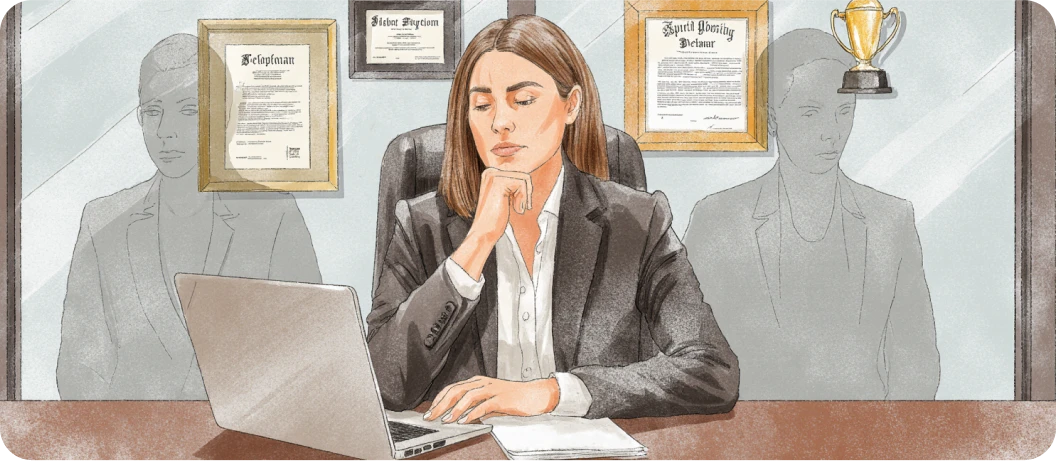Have you ever thought that your achievements are a coincidence, rather than the result of your hard work or competence? Or do you believe your success was due to external factors, or simply because you were given a simple task? If so, you may be experiencing imposter syndrome, a condition in which a person constantly devalues their achievements and believes that they’ve somehow fooled others into thinking they’re competent.
Imposter syndrome is not an official mental health diagnosis, but rather a negative pattern of behavior that can influence your personal life and your comfort at work. Let’s find out if you may have it.
Imposter Syndrome Test
This quick and insightful quiz is designed to help you understand how negative thoughts or difficulty internalizing success may affect your confidence and well-being. Choose “Yes” or “No” based on how often or strongly the statement applies to you.
1. Do you think you accomplished most of your achievements simply through coincidence or luck?
- Yes
- No
2. Do you believe that if you succeed in something, anyone can do it or even better than you did?
- Yes
- No
3. Do you often think that your success is not deserved?
- Yes
- No
4. Do you often doubt that you are really as good as others think you are?
- Yes
- No
5. Is it important for you to do everything or most things perfectly?
- Yes
- No
6. Do you believe you create the impression that you know more than you actually do?
- Yes
- No
7. When being criticized, do you feel embarrassed and insignificant?
- Yes
- No
8. Does making even minor mistakes feel distressing?
- Yes
- No
9. Do you sometimes or often downplay your achievements?
- Yes
- No
10. Do you often doubt yourself when making decisions?
- Yes
- No
11. Do you often compare yourself to others and believe that they are more competent than you?
- Yes
- No
12. Do you find it difficult to accept compliments for your achievements?
- Yes
- No
13. When you are praised, are you afraid that you will not live up to expectations next time?
- Yes
- No
14. Do you generally believe that people around you are more intelligent than you?
- Yes
- No
15. Does your success feel random?
- Yes
- No
Impostor Syndrome Test Results
Now that you’ve completed the quiz, count “Yes” responses. Use the guide below to interpret your results:
0–4 “Yes” Answers: Low Imposter Syndrome Feelings
You generally have a positive view of your abilities and achievements. You may have occasional self-doubt, but it likely doesn’t interfere with your confidence or daily life functioning.
5–7 “Yes” Answers: Moderate Imposter Feelings
You may sometimes feel like you’re not good enough or fear being “found out.” These negative thoughts might hold you back or add unnecessary pressure. Developing self-awareness and practicing self-compassion could help you recognize when you’re slipping into self-doubt or perfectionism and offer a softer, more understanding response to your inner struggles. Instead of asking, “What is wrong with me?” you may begin to ask, “What do I need right now?” This shift can break the self-critical cycle and shame spiral.
8 or More “Yes” Answers: Strong Imposter Syndrome Signs
According to your answers, you likely experience persistent feelings of self-doubt, feeling like a failure, or a belief that your success isn’t deserved. These entrenched patterns may be affecting your well-being, work satisfaction, or relationships. It may be reassuring to know that you’re not alone. Studies suggest that up to 70% of people have experienced impostor syndrome at work [4].
One of the most effective paths toward healing is working with a therapist, where you can discover these frustrating feelings and overcome signs of imposter syndrome to prevent burnout [5].
Try the personality types test to recognize how your personality, thoughts influence your self-perception and decision-making.
Imposter Syndrome in Psychology
Psychologists Pauline R. Clance and Suzanne A. Imes coined the term “impostor phenomenon” and developed the Clance Impostor Phenomenon Scale after conducting research on successful women in therapy sessions [1]. The study found that, despite evidence of their accomplishments, these women had negative self-evaluations and believed they could not handle delegated tasks. They also feared being exposed as “frauds” or incompetent and unqualified workers and told they did not deserve their success [2].
Even if someone has significant qualifications and experience, imposter phenomenon can make them feel like they are not good enough. People with imposter syndrome tend to compare themselves to others and believe that others are more capable than they are.
This can make them experience dissatisfaction with their abilities. Over time, it can result in intense anxiety and depression, according to research published by the American Psychological Association [3].

Are You Looking for More Quizzes?
If you’re struggling with self-doubt, feeling like you’re just “faking it” despite your achievements, and want a tool you can use anytime to learn how to feel your feelings and manage them, build confidence, and feel more secure, Breeze Wellbeing is your support for overcoming imposter syndrome and becoming the best version of yourself.
With just 10 minutes a day, you can:
- Track your mood and identify what triggers self-doubt
- Access science-backed strategies to build confidence and reduce anxiety
- Develop healthy habits that support emotional resilience with super-helpful yet easy-to-use routines that you can customize according to your needs
- Enjoy guided exercises for relaxation, focus, and calming your inner critic
- Take self-discovery quizzes about relationships, career quiz, childhood trauma, personality type, and many more to gain insights into your strengths and vulnerabilities
If you want a tool that fits easily into your daily life and helps you take small, meaningful steps toward overcoming imposter syndrome, the Breeze app is here for you.
Expert Insight
The first step to coping with imposter syndrome is building mindfulness. Start to label and accept your triggers for what they are. From there, you can pause and be intentional with how you respond to those triggers when they arise. With that, it’s important to anchor yourself to knowing that, while imposter syndrome may feel real, it doesn’t actually mean you’re genuinely inferior or incapable.
Nicole Arzt
Mental health professional
Sources
- Clance, P. R. Clance Impostor Phenomenon Scale.
- Clance P.R, Imes S.A. The imposter phenomenon in high achieving women: Dynamics and therapeutic intervention.
- Kirsten Weir. Feel like a fraud? 2013.
- Jaruwan Sakulku, James Alexander. The Impostor Phenomenon. 2011.
- Dena M. Bravata MD, MS, Sharon A. Watts MA, Autumn L. Keefer PhD, Divya K. Madhusudhan MPH, Katie T. Taylor PhD, Dani M. Clark BA, Ross S. Nelson PsyD, Kevin O. Cokley Ph.D. & Heather K. Hagg PhD. Prevalence, Predictors, and Treatment of Impostor Syndrome: a Systematic Review. December 2019.
Disclaimer
This article is for general informative and self-discovery purposes only. It should not replace expert guidance from professionals.
Any action you take in response to the information in this article, whether directly or indirectly, is solely your responsibility and is done at your own risk. Breeze content team and its mental health experts disclaim any liability, loss, or risk, personal, professional, or otherwise, which may result from the use and/or application of any content.
Always consult your doctor or other certified health practitioner with any medical questions or concerns
Breeze articles exclusively cite trusted sources, such as academic research institutions and medical associations, including research and studies from PubMed, ResearchGate, or similar databases. Examine our subject-matter editors and editorial process to see how we verify facts and maintain the accuracy, reliability, and trustworthiness of our material.
Was this article helpful?




